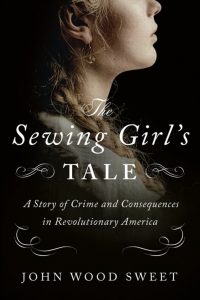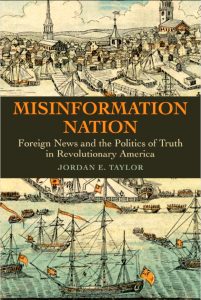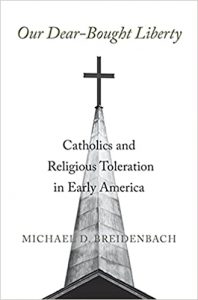Since 2014, the Journal of the American Revolution has recognized the adult nonfiction volume that best mirrors the mission of the journal with its national Book-of-the-Year Award. This year the editors are pleased to announce a winner and two runners-up. All three books are outstanding contributions to the history of the Revolutionary and Founding Eras.
Award Winner
 The Sewing Girl’s Tale: A Story of Crime and Consequences in Revolutionary America by John Wood Sweet. (New York, NY: Henry Holt and Company, 2022)
The Sewing Girl’s Tale: A Story of Crime and Consequences in Revolutionary America by John Wood Sweet. (New York, NY: Henry Holt and Company, 2022)
University of North Carolina at Chapel Hill Professor John Wood Sweet has published an intense narrative of a crime committed against a young woman in post-Revolutionary New York City. The main character, the seventeen-year-old seamstress Lanah Sawyer, found that she had reserves of courage by doing the unthinkable: she accused Harry Bedlow, a well-connected young man, of rape. Doing so was unheard of, since women of Lanah’s age were expected to keep quiet about being seduced or forced into sex.
John Wood Sweet writes about the culture of 1790s New York City, when it was the national capital and George Washington was the first president. He explains how the crime of rape was handled in the court system and how powerless the victims were whenever they came forward, which they rarely did. That is what makes The Sewing Girl’s Tale: A Story of Crime and Consequences in Revolutionary America so unique: Lanah did come forward and pointed her finger at her attacker. What follows is a story of New York City, its brothels, the neighborhoods at the tip of Manhattan, and how rape cases were heard in both criminal and civil courts. Besides Lanah Sawyer and Harry Bedlow, the reader is introduced to various characters, such as Mother Carey, attorneys John Callahan and Richard Harrison, and Sawyer’s family and neighbors. Alexander Hamilton even plays a role at one point. Wood includes how the press dealt with rape cases, and the bad conditions of debtor’s prisons.
Lanah Sawyer’s case was well-documented, which John Wood Sweet successfully takes advantage of. Unfortunately, little is known about the life of Lanah Sawyer herself outside of the details recorded in trial records, typical of working-class women during this period. But the author skillfully fills in the gaps in the historical record to complete what her life and her small world were probably like. Highly readable and original, The Sewing Girl’s Tale: A Story of Crime and Consequences in Revolutionary America deserves to win the Journal of the American Revolution National Book Award.
Read our review of The Sewing Girl’s Tale.
This year we chose two runners-up, because both books, while focused entirely on events of the eighteenth century, deal with themes that continue to be important today: the influence of news media, and religious intolerance.
Runners-Up
 Misinformation Nation: Foreign New and the Politics of Truth in Revolutionary America by Jordan E. Taylor. (Baltimore, MD: Johns Hopkins University Press, 2022)
Misinformation Nation: Foreign New and the Politics of Truth in Revolutionary America by Jordan E. Taylor. (Baltimore, MD: Johns Hopkins University Press, 2022)
The concept of “fake news” is not new. The newspapers published in the thirteen colonies and later the United States were all guilty of printing news that was not new or original. The purpose, however, was not really to deceive the readers. The problem was that newspapers did not have any consistently reliable sources for information. News traveled slowly, and so it was often second-hand. One story might have several sources and interpretations, leaving the newspaper with little to work with. Foreign news especially was questionable. News arrived late if it was fortunate enough to make the long journey across the Atlantic.
Jorden E. Taylor’s meticulously researched book Misinformation Nation: Foreign New and the Politics of Truth in Revolutionary America closely examines the print-media of the late eighteenth century, how reliable it was, and how it was used to form people’s opinions about the American Revolution and the society it created. People reacted to news that was misunderstood, leading to uninformed overreactions. But they were desperate for more news, so newspapers did their best to print any news that they could get their hands on, even if was false. Misinformation Nation: Foreign News and the Politics of Truth in Revolutionary Americais an excellent study of the Fourth Estate and how it tried to get it right, or at least get it published.
Read our review of Misinformation Nation.
 Our Dear-Bought Liberty: Catholics and Religious Toleration in Early America by Michael D. Breidenbach. (Cambridge, MA: Harvard University Press, 2021)
Our Dear-Bought Liberty: Catholics and Religious Toleration in Early America by Michael D. Breidenbach. (Cambridge, MA: Harvard University Press, 2021)
The United States has had a long history of intolerance for the Roman Catholic religion. English settlers to North America saw allegiance to the Bishop of Rome to be anti-democratic. Catholic settlers had to prove their loyalty to the new nation by denying the infallibility of the pope. By doing so, they would be considered Americans. Catholics who rejected the authority of Rome were welcomed, signing the Declaration of Independence and influencing the First Amendment. American Catholics did not turn their backs on their faith, embracing a concept known as “conciliarism” that was compatible with independence and church-state separation.
Our Dear-Bought Liberty: Catholics and Religious Toleration in Early Americaby Michael D. Breidenbach is an examination of how Roman Catholics were able to make their presence acceptable in the majority-Protestant culture of British North America. Breidenbach not only analyzes how Catholics used their oaths to the English King, and later to the new American government, to keep their religious identity intact, but also how the concept of religious freedom entered American political thought. The Calverts of Maryland and later John Carroll, the first Catholic bishop in the United States, are central characters to the story of how the Catholic community influenced American culture.
Read our review of Our Dear-Bought Liberty.






Recent Articles
A Strategist in Waiting: Nathanael Greene at the Catawba River, February 1, 1781
This Week on Dispatches: Brady J. Crytzer on Pope Pius VI and the American Revolution
Advertising a Revolution: An Original Invoice to “The Town of Boston to Green and Russell”
Recent Comments
"A Strategist in Waiting:..."
Lots of general information well presented, The map used in this article...
"Ebenezer Smith Platt: An..."
Sadly, no
"Comte d’Estaing’s Georgia Land..."
The locations of the d'Estaing lands are shown in Daniel N. Crumpton's...